Nuremberg’s past as the epicenter of the Nazi regime is both fascinating and chilling. The ‘Nuremberg: Historic Third Reich Tour’ in Spanish offers an immersive exploration of this dark chapter, guiding visitors through the city’s notorious landmarks. From the annual Nazi Party rallies to the enactment of the Nuremberg Laws, the tour delves into the mechanisms of propaganda that shaped public perception and fueled the rise of anti-Semitism. With thoughtful historical explanations and logistical convenience, this tour promises an engaging and educational experience for those seeking to understand Nuremberg’s complex legacy.
This experience made our list of the 25 Best Tours In Nuremberg.
Key Points
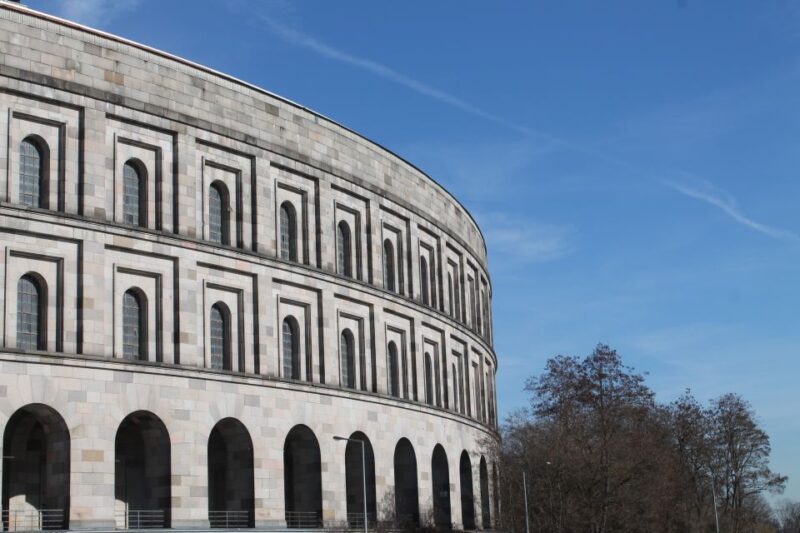
- Guided walking tours in Spanish explore Nuremberg’s history as a propaganda hub and ideological center of the Nazi regime.
- Tours highlight Nuremberg’s role in hosting annual Nazi Party rallies and the enactment of the oppressive Nuremberg Laws.
- Visitors learn about the anti-Semitic propaganda campaigns of Julius Streicher and the influence of Der Stürmer newspaper.
- The tour provides insights into Nuremberg’s deep-rooted loyalty to the Nazi regime and its symbolic significance in their quest for power.
- The Nuremberg Trials, which addressed war crimes and established precedents for international human rights, are also covered in the tour.
Nuremberg’s Propaganda Center
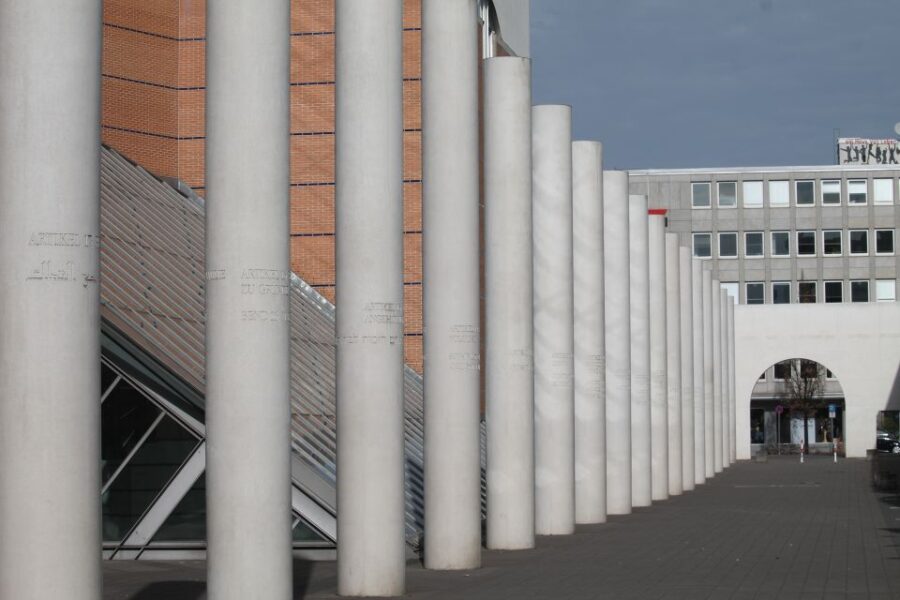
Nuremberg was the propaganda center of the Third Reich, as it was considered the heir to Germanic traditions by Adolf Hitler and his regime. The city was home to the annual Nazi Party rallies, massive displays of Nazi power and ideology.
It was also the site of the Nuremberg Laws, which stripped Jews of their citizenship and prohibited them from marrying or having sexual relations with Germans. Plus, Julius Streicher, a prominent Nazi and the publisher of the anti-Semitic newspaper Der Stürmer, operated in Nuremberg, further promoting hatred and intolerance.
Nuremberg’s central role in the Nazi propaganda machine made it a symbol of the regime’s dark ambitions and the oppression it inflicted upon those it deemed undesirable.
Fascinated by Nuremberg's past? More historical tours we've covered
Germanic Traditions and Hitler
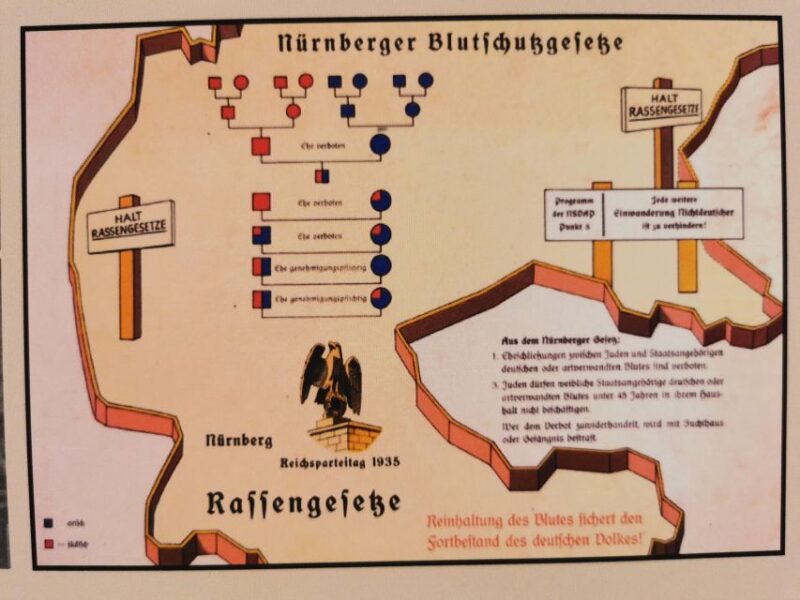
Adolf Hitler considered Nuremberg the heir to Germanic traditions, as the city’s historical and cultural significance aligned with the Nazi regime‘s nationalist ideology.
The Nazis sought to establish Nuremberg as a symbolic center of their movement, hosting the annual party rallies that showcased their power and propaganda.
The rallies, which drew thousands of supporters, were carefully choreographed events designed to instill a sense of unity and national pride.
Nuremberg’s rich medieval history, with its Gothic architecture and imperial past, resonated with the Nazis’ desire to revive the glories of the German Empire.
Nuremberg Laws and Anti-Semitism
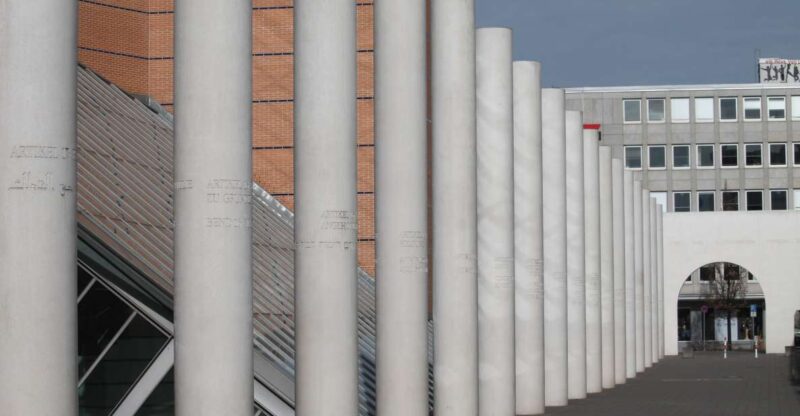
The Nuremberg Laws, introduced in 1935, established a legal framework for institutionalizing anti-Semitism within the Third Reich. These racist laws deprived German Jews of their citizenship and prohibited marriages or sexual relations between Jews and non-Jews. The laws also restricted the employment of Jews in certain professions and limited their access to public facilities. This systematic marginalization of the Jewish population laid the groundwork for the more extreme measures of the Holocaust that would follow.
| Key Features of the Nuremberg Laws |
|---|
| Stripped German Jews of citizenship |
| Banned marriages/relationships between Jews and non-Jews |
| Restricted Jewish employment and access to public spaces |
| Legitimized anti-Semitism as state policy |
| Laid foundations for the Holocaust |
Julius Streicher and Der Stürmer
Julius Streicher, a virulent anti-Semite, used his newspaper Der Stürmer as a platform to promote vicious hatred and conspiracy theories against the Jewish population in Germany.
As the publisher and editor-in-chief, Streicher regularly featured hateful articles and cartoons that demonized and dehumanized Jews, fueling the Nazi’s growing anti-Semitic agenda.
Der Stürmer became a mouthpiece for the regime’s racist ideology, directly influencing the enactment of the Nuremberg Laws that stripped Jews of their citizenship and rights.
Streicher’s relentless propaganda played a crucial role in normalizing and legitimizing the persecution and eventual genocide of the Jewish people during the Holocaust.
His actions cemented Nuremberg’s status as the ideological center of the Third Reich’s anti-Semitic policies.
More Great Thing To Do NearbyNuremberg’s Loyalty to Nazis
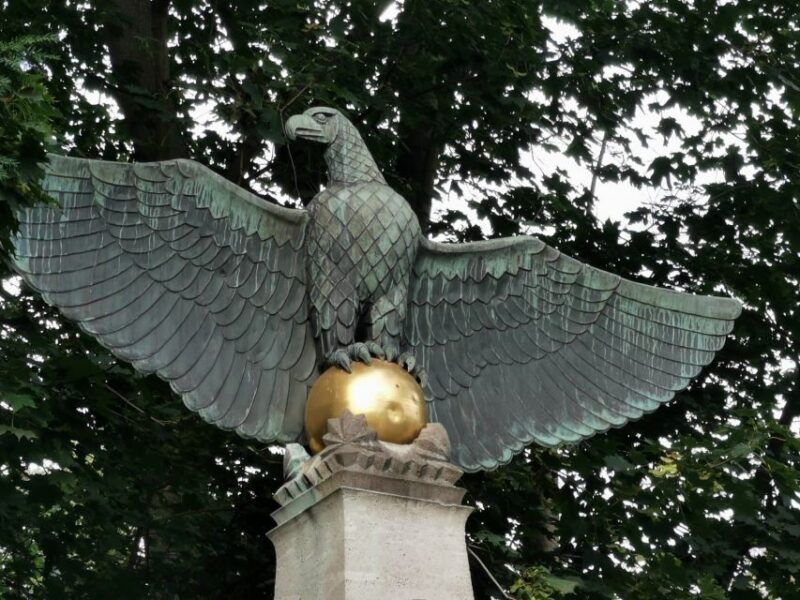
Nuremberg’s unwavering loyalty to the Nazi regime was a defining characteristic that cemented its status as the most faithful city to Hitler’s vision for the Third Reich.
The city served as the epicenter of the party’s propaganda machine, hosting the annual Nazi Party congresses that showcased the regime’s power and ideology.
Nuremberg was also the site of the infamous Nuremberg Laws, which stripped Jews of their citizenship and rights.
On top of that, the city was home to Julius Streicher, a virulent anti-Semite who used his newspaper, Der Stürmer, to propagate hatred and intolerance.
Nuremberg’s deep-rooted devotion to the Nazi cause made it a symbol of the regime’s uncompromising control over the German populace.
- Medieval Tour in Nuremberg in English
- Nuremberg Old Town and Nazi Party Rally Grounds Walking Tour in English
- Nuremberg Third Reich Tour in English
- City Tour Through Nuremberg With the Bimmelbahn
- Nuremberg: Crime Escape Game – Self-Guided Crime Tour
- Nuremberg Private Walking Tour: Old Town and Nazi Rally Grounds
Nuremberg Trials and Human Rights
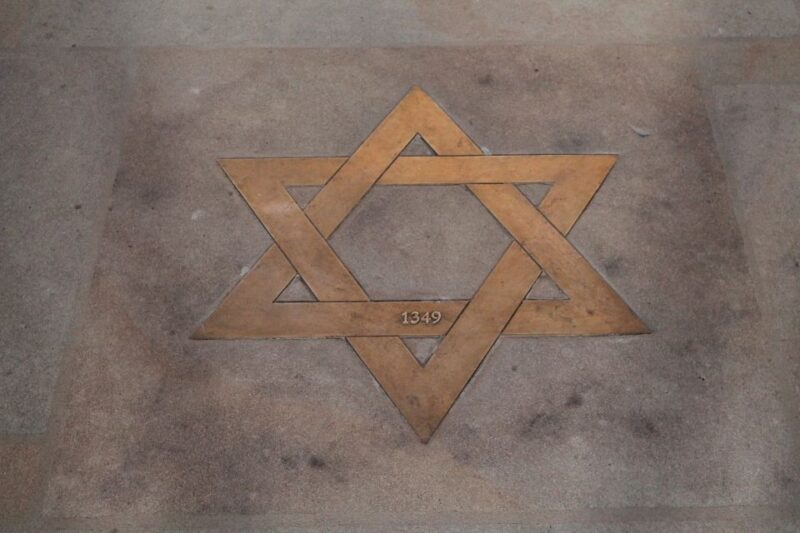
Aftermath of the Nazi regime’s atrocities culminated in the Nuremberg Trials, which brought perpetrators of war crimes and crimes against humanity to justice and paved the way for international human rights law.
The trials, held from 1945 to 1949, were a pivotal moment in history, establishing the principle that individuals could be held accountable for their actions under international law.
The rulings set a precedent for universal human rights, condemning the Nazi’s systematic persecution and murder of millions.
The trials also led to the creation of the Nuremberg Principles, which codified the laws of war and defined crimes against peace, war crimes, and crimes against humanity.
This landmark event continues to shape global efforts to protect human rights and prevent future atrocities.
Nazi Party Congresses and Flossenburg
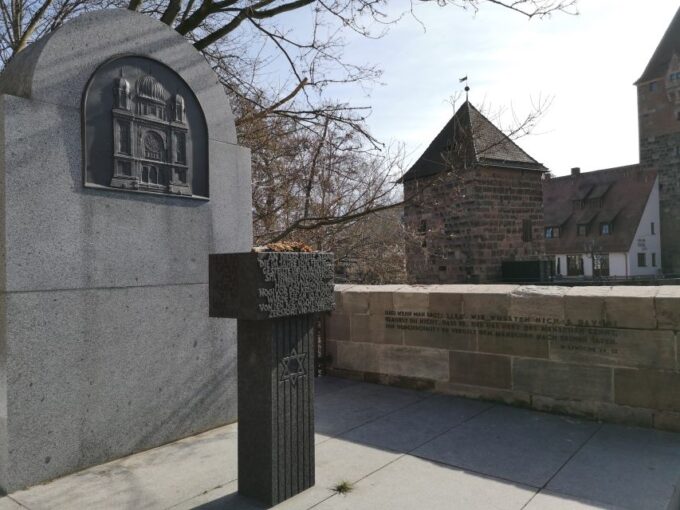
The Nazi Party Congresses held in Nuremberg were a pivotal part of the regime’s propaganda efforts, showcasing its power and ideology to both domestic and international audiences.
These annual gatherings, which began in 1923, allowed the Nazis to consolidate their control and rally support for their vision of a racially pure German state.
The grand spectacle of the rallies, with their marching columns, mass choreography, and symbolic architecture, left a lasting impression on those in attendance.
Plus, the nearby Flossenburg concentration camp served as a grim reminder of the regime’s ruthless treatment of those deemed undesirable.
These events highlighted Nuremberg’s central role in the Third Reich’s quest for power and control.
Tour Features and Customer Reviews
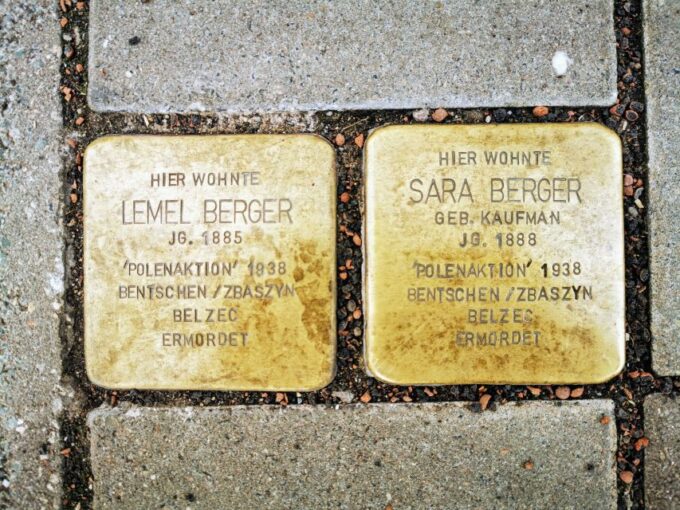
The tour offers a range of features that cater to visitors’ needs and preferences, including guided walking tours with professional Spanish-speaking guides, hotel pick-up and drop-off, and the inclusion of food, drinks, and gratuities.
The tour is also wheelchair accessible, and private group options are available for those seeking a more personalized experience.
Based on the overwhelmingly positive customer reviews, the tour has been praised for the clarity of the historical explanations provided by the engaging guide, Federico, and the effective use of visual aids, such as maps and photographs, to enhance understanding.
With an overall rating of 5/5 and high marks for value for money, this tour offers a compelling and informative exploration of Nuremberg’s role in the Third Reich.
Frequently Asked Questions
Does the Tour Provide Any Food or Refreshments?
The tour includes food and drinks, according to the information provided. Participants can expect refreshments to be offered during the 3-hour guided walking tour exploring the historical significance of Nuremberg’s role in the Third Reich.
Can the Tour Be Customized for Private Groups?
Yes, the tour can be customized for private groups. According to the information provided, the tour offers "private group options available" as one of its features, allowing for a personalized experience.
What Is the Cancellation Policy for the Tour?
The tour has a free cancellation policy. Customers can receive a full refund if they cancel up to 24 hours before the scheduled tour. This provides flexibility and peace of mind when booking the tour.
Is the Tour Suitable for Individuals With Disabilities?
Yes, the tour is wheelchair accessible, making it suitable for individuals with disabilities. The tour provider offers private group options to accommodate guests with special needs and ensure a comfortable experience.
How Do I Locate the Meeting Point for the Tour?
The meeting point for the tour is in front of the main entrance of the Frauenkirche, Hauptmarkt. Participants should look for the white and red umbrellas to identify the tour group’s location.
Recap
The ‘Nuremberg: Historic Third Reich Tour’ offers a comprehensive and educational exploration of the city’s dark history during the Nazi era.
Guided by professionals, the tour covers the annual Nazi Party rallies, the Nuremberg Laws, and the role of propaganda, providing valuable insight into this pivotal period.
With accessibility features and positive reviews, the tour is an engaging and informative experience for those seeking to understand Nuremberg’s complex past.
You can check if your dates are available here:More Historical Tours in Nuremberg
More Tours in Nuremberg
More Tour Reviews in Nuremberg
- Get to Know Nuremberg. Highlights in the Old Town
- Private Nuremberg Departures Airport Transfer From Nuremberg City Center
- Nuernberg City Groove To the Bardentreffen
- Champagne Breakfast and Escape Game in Nurembergs Old Town
- Discover Nuremberg: Self-Guided Audio Tour
- Private Photo Session With a Local Photographer in Nuremberg
Not for you? Here's more things to do in Nuremberg we have recnetly reviewed
- 2 Best Dining Experiences In Nuremberg
- 3 Best Shopping Tours In Nuremberg
- 6 Best Christmas Experiences In Nuremberg
- 2 Best Food Tours In Nuremberg
- Private Transfer: River Cruise Dock Nuremberg to Prague: Port / Harbor Transport
- Nuremberg Through the Centuries: a Historical Audio Tour
- Private Transfer From Nuremberg to Prague
- Tour at the Former Nazi Party Rally Grounds
- Private Professional Wedding Photography in Erlangen
- Explore the Instaworthy Spots of Nuremberg With a Local
- Nuremberg Culinary Walking Tour
- Nuremberg to Prague – Private Transfer With 2 Hours of Sightseeing
